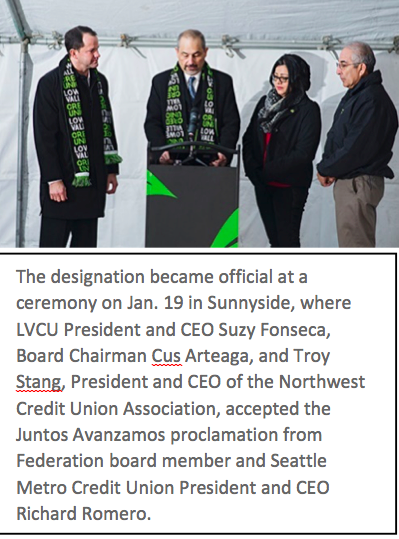Credit unions – the original social justice

Financial inclusion has become an important means of promoting social justice in the world.
The movement emphasizes continually improving and increasing the availability of products and services that enable overlooked and underserved, lower-income consumers obtain affordable, convenient, and relevant financial services.
The term “social justice” is the buzzword of the moment in some circles, but in the credit union space, social justice and financial inclusion are more than just terms. They encompass where we started, and they represent what thousands of us continue to pursue each day, working together to find ways to reach and help advance the overlooked and underserved among us.
Financial inclusion best practice today
Last month, I was an honored guest of Lower Valley Credit Union (LVCU) in Sunnyside, Wash. at the recognition of their national Juntos Avanzamos designation. LVCU and their fellow Juntos Avanzamos program partners and certified credit unions are great examples of financial inclusion and social justice in action.

Juntos Avanzamos, Together We Advance, is a designation for credit unions committed to serving and empowering Hispanic consumers. Juntos Avanzamos was developed by the Cornerstone Credit Union League. Working together, the National Federation of Community Development Credit Unions, the Cornerstone League, Coopera, and a growing number of other credit union leagues have expanded the program to a national footprint.
The Juntos Avanzamos designation is earned through a commitment to providing affordable financial access and development services to increase financial capability in the Hispanic community. This commitment is expansive, and includes things such as adequate bilingual staff, management, and board; cultural buy-in and a commitment to financial inclusion; active relationships within the Hispanic community; relevant products and services, such as credit-builder loans, ITIN loans, second-chance checking, and financial education and counseling; and developing a formal Hispanic outreach strategy.
Today, there are more than 40 credit unions nationally that have received this designation. LVCU is the most recent, and the first credit union in the Pacific Northwest to be so honored.
LVCU’s story of financial inclusion and impact

LVCU has created and leveraged its assets and capacity to organize with others to benefit its entire community. It’s an amazing story, and I take every opportunity to share it, because it exemplifies the original purpose of credit unions, and demonstrates that credit unions and leaders can do well by doing good.
LVCU has a long history of serving the lower-income, Hispanic community in southeastern Washington State. In 2010, the credit union’s focus on serving this market intensified as the board selected Suzy Fonseca as the new President/CEO. Suzy grew up in the area, and is a first-generation Mexican American.
Suzy’s passion for LVCU and the communities it serves is best described as relentless. In 2011, Suzy rallied her team and board as they worked collectively to clarify their vision to “plant seeds of opportunity for a better tomorrow.” This simple vision statement clearly articulates the reason so many of the people in her community migrated to the United States. It’s intentional that LVCU’s culture, products, and services are the seeds of financial inclusion that lead to a better quality of life.
Here are three examples of how LVCU’s products and development services impact its members and community:
- Reliable Rides to Work
Transportation, job access, and income go hand-in-hand. In order for families to gain employment, arrive at work on time, and be available for extra shifts (which translate into greater income), they need reliable transportation that provides access to suitable jobs. Unfortunately, many of the families in low-income neighborhoods are at a disadvantage because of non-existent public transportation, and mainstream financial institutions that refuse to fund loans to low-income, unbanked, underbanked, and migrant consumers.
At LVCU, affordable used-auto loans are offered to low-income and credit-challenged consumers. At 13.2 percent, the average subprime interest rates at LVCU are 127 percent lower than the average 30-percent rate charged by the “Buy Here, Pay Here” lots. LVCU will make $500 used-auto loans, which is something most of the traditional lenders will not do in these low-income communities.
- ITIN Lending
The ITIN is an official number issued by the Internal Revenue Service that allows working nonresidents to declare their taxes. Unlike most financial institutions, LVCU will use the ITIN document (when a Social Security Number is not available) for opening new accounts and for making loans. Many of LVCU’s members come to them with just an ITIN and no formal credit rating. LVCU staff provide one-on-one counseling, explaining to members how to use their ITIN to open an account and apply for their first loan to establish credit. LVCU’s first-time program gives people their first shot at credit, and as the credit union’s low average delinquency and charge-off ratio demonstrates, these first time borrowers pay back their loans. LVCU’s remarkably strong membership growth demonstrates the high volume of referrals generated from serving this loyal demographic.
Since 2012, LVCU has originated 2,432 ITIN loans for hardworking, lower-income consumers. The quality of life impact on these consumers is measurable and significant. LVCU measures the progress these members make in building and maintaining their credit. Credit Migration reports reflect that 67 percent of these members have increased their credit score by at least one tier. Improved credit creates opportunities for better jobs, better pay, and lower premiums and interest rates. It also prepares these consumers for future homeownership.
- Path to U.S. Citizenship
A 2012 study by the Migration Policy Institute found that naturalized citizens earn more than their non-citizen counterparts, are less likely to be unemployed, and are better represented in highly skilled jobs. Naturalized immigrants have higher levels of education, better language skills and more work experience within the country than non-citizens. Despite the potential economic and other benefits of citizenship, far fewer immigrants naturalize than are eligible to do so. An estimated 8 million lawful permanent residents are eligible to apply, but haven’t done so because of the cost associated with the process.

Working with its partners, LVCU launched a statewide citizenship loan program in 2014 that is relevant and affordable for foreign-born, Hispanic consumers living in the Lower Valley. Besides LVCU, the program consists of three key partners: OneAmerica, Washington New Americans, and the American Immigration Lawyers Association. Working together, this partnership is focused on reaching the immigrant community, providing the education needed to navigate the complicated citizenship process, reviewing potential legal issues, and completing all of the documents necessary to submit to U.S. Department of Homeland Security.
Since the program’s inception in 2014, more than 300 consumers have completed the pathway to citizenship and are now being sworn in as U.S. citizens. Approximately 150 people were sworn in on July 4 at the local town park.
Why it matters
Today, tens of millions of consumers are overlooked and underserved. Credit unions were charted to serve the overlooked and underserved. It’s what we do.
Unfortunately, a fair number of us are having an identity crisis, and needs to reconnect with our roots to find greater meaning and relevance in a financial market that is hyper-focused on people perceived worthy enough to be included.
Perhaps there has never been a better time for credit unions, especially those that are stagnant and having a difficult time growing, to focus on financial inclusion and social justice. For many credit unions, choosing to focus on underserved markets provides for their bottom lines as well. LVCU is a great example of a credit union that has demonstrated financial strength through a philosophy of inclusion.
Consider LVCU’s five-year annual average growth ratios:
- Loan growth: 21.93%
- Membership growth: 17.86%
- Asset growth: 15.67%
- Net Worth growth: 11.24%
The good news is that everyone wins (credit unions, communities, members) when credit unions focus on financial inclusion. Look around you. If you have an underserved market in one of the communities you serve – even if its small and emerging – you may want to investigate opportunities to reach out and include those groups. It just might prove to be the shot in the arm your credit union and community needs for a better quality of life!
Juntos Avanzamos Indeed!!!





